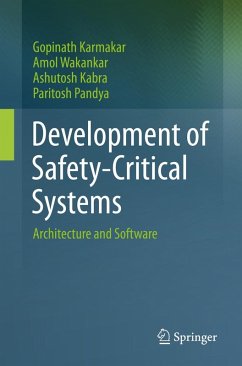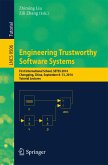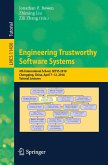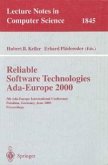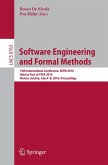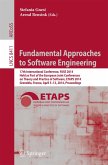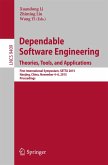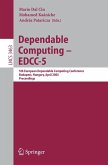This book provides professionals and students with practical guidance for the development of safety-critical computer-based systems. It covers important aspects ranging from complying with standards and guidelines to the necessary software development process and tools, and also techniques pertaining to model-based application development platforms as well as qualified programmable controllers.
After a general introduction to the book's topic in chapter 1, chapter 2 discusses dependability aspects of safety systems and how architectural design at the system level helps deal with failures and yet achieves the targeted dependability attributes. Chapter 3 presents the software development process which includes verification and validation at every stage, essential to the development of software for systems performing safety functions. It also explains how the process helps in developing a safety case that can be independently verified and validated. The subsequent chapter 4 presents some important standards and guidelines, which apply to different industries and in different countries. Chapter 5 then discusses the steps towards complying with the standards at every phase of development. It offers a guided tour traversing the path of software qualification by exploring the necessary steps towards achieving the goal with the help of case studies. Chapter 6 highlights the application of formal methods for the development of safety systems software and introduces some available notations and tools which assist the process. Finally, chapter 7 presents a detailed discussion on the importance and the advantages of qualified platforms for safety systems application development, including programmable controller (PLC) and formal model-based development platforms. Each chapter includes case studies illustrating the subject matter.
The book is aimed at both practitioners and students interested in the art and science of developing computer-based systems for safety-critical applications. Both audiences will get insights into the tools and techniques along with the latest developments in the design, analysis and qualification, which are constrained by the regulatory and compliance requirements mandated by the applicable guides and standards. It also addresses the needs of professionals and young graduates who specialize in the development of necessary tools and qualified platforms.
After a general introduction to the book's topic in chapter 1, chapter 2 discusses dependability aspects of safety systems and how architectural design at the system level helps deal with failures and yet achieves the targeted dependability attributes. Chapter 3 presents the software development process which includes verification and validation at every stage, essential to the development of software for systems performing safety functions. It also explains how the process helps in developing a safety case that can be independently verified and validated. The subsequent chapter 4 presents some important standards and guidelines, which apply to different industries and in different countries. Chapter 5 then discusses the steps towards complying with the standards at every phase of development. It offers a guided tour traversing the path of software qualification by exploring the necessary steps towards achieving the goal with the help of case studies. Chapter 6 highlights the application of formal methods for the development of safety systems software and introduces some available notations and tools which assist the process. Finally, chapter 7 presents a detailed discussion on the importance and the advantages of qualified platforms for safety systems application development, including programmable controller (PLC) and formal model-based development platforms. Each chapter includes case studies illustrating the subject matter.
The book is aimed at both practitioners and students interested in the art and science of developing computer-based systems for safety-critical applications. Both audiences will get insights into the tools and techniques along with the latest developments in the design, analysis and qualification, which are constrained by the regulatory and compliance requirements mandated by the applicable guides and standards. It also addresses the needs of professionals and young graduates who specialize in the development of necessary tools and qualified platforms.
Dieser Download kann aus rechtlichen Gründen nur mit Rechnungsadresse in A, B, BG, CY, CZ, D, DK, EW, E, FIN, F, GR, HR, H, IRL, I, LT, L, LR, M, NL, PL, P, R, S, SLO, SK ausgeliefert werden.
Es gelten unsere Allgemeinen Geschäftsbedingungen: www.buecher.de/agb
Impressum
www.buecher.de ist ein Shop der
buecher.de GmbH & Co. KG
Bürgermeister-Wegele-Str. 12,
86167 Augsburg
Amtsgericht Augsburg HRA 13309
Persönlich haftender Gesellschafter: buecher.de Verwaltungs GmbH
Amtsgericht Augsburg HRB 16890
Vertretungsberechtigte:
Günter Hilger, Geschäftsführer
Christian Sailer, Geschäftsführer
Sitz der Gesellschaft:Augsburg
Ust-IdNr. DE 204210010

